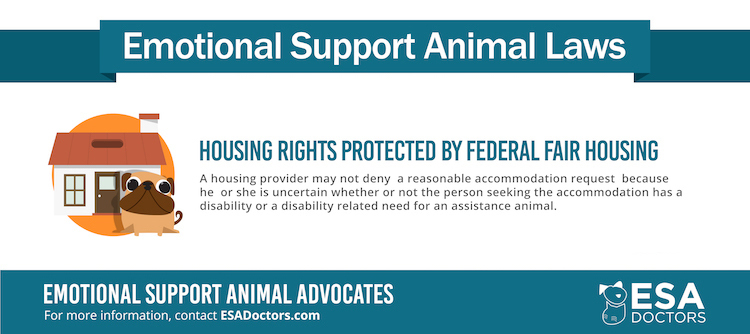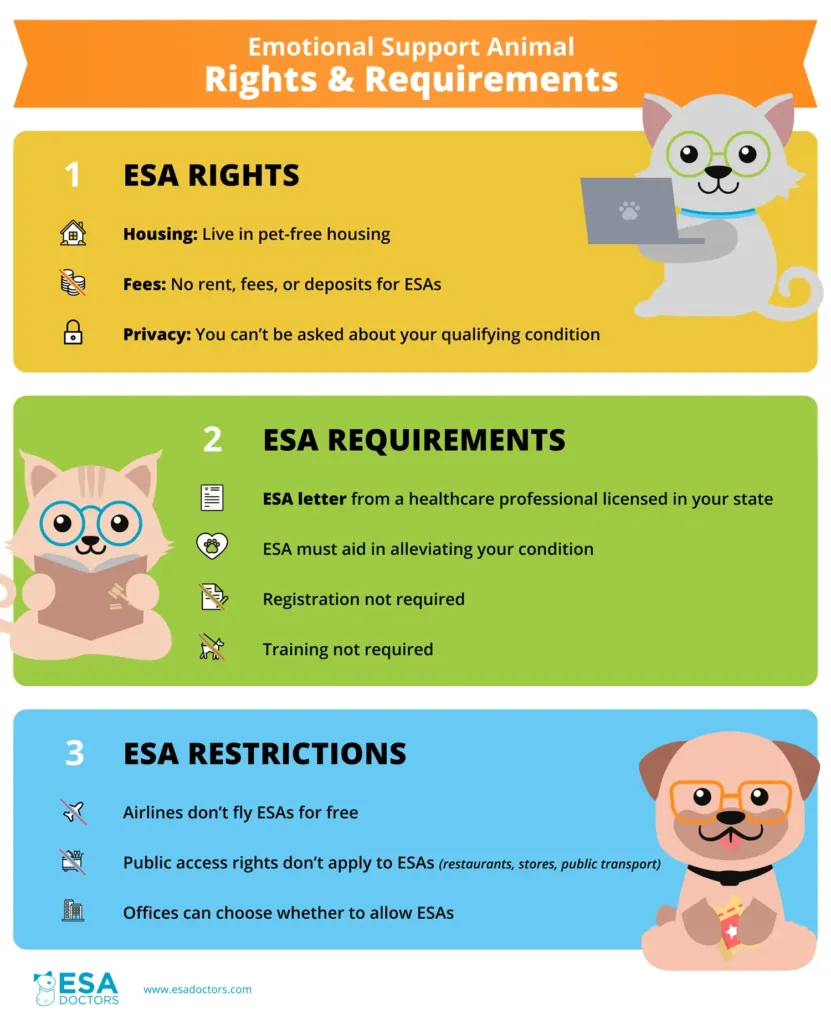Federal and state laws protect your right to have an emotional support animal in your home. Our ESA rules experts have reviewed them so you can get answers to all of your ESA-related questions about housing in no-pet buildings and whether you can travel with an ESA on a plane or bring them to a restaurant.
In this article, we explain what these laws are and how they protect you and your emotional support animal.
Emotional Support Animal Owners Are Protected by Federal Laws
There are three major federal laws that deal with assistance animals, but only one is really important for you to know if you have an emotional support animal. These laws are known as the Fair Housing Act (FHA), the Air Carrier Access Act (ACAA), and the Americans with Disabilities Act (ADA).
What is the Fair Housing Act?
Under the federal Fair Housing Act, landlords must accommodate tenants who own emotional support animals, even if the building has a policy that prohibits pets. This applies to all 50 states. The US Department of Housing (HUD) issues guidance on how the provisions of the FHA are implemented and enforces Fair Housing rules.
What is the Air Carrier Access Act?
As a result of new DOT rules for emotional support animals that came out in 2021, ESAs in the U.S. are no longer given special consideration on flights; they are treated as normal pets.
Psychiatric service dogs, however, are still protected under the Air Carrier Access Act, and all airlines must allow passengers with PSDs (and other types of service dogs) to fly in the cabin free of charge.
What is the Americans with Disabilities Act?
The Americans with Disabilities Act (ADA) specifically protects service dogs — dogs that are trained to perform tasks that help with disabilities. Think of a dog that guides someone with vision impairment through city streets or provides deep pressure therapy to someone having a panic attack. These dogs can go pretty much anywhere their handler goes – stores, restaurants, movie theaters — because they’re essential for their handler’s daily functioning.
ESAs work differently. While they provide real emotional comfort and support, they’re not covered by the ADA. This means that, unlike service dogs, they can’t automatically come with you into public spaces. Your ESA has solid rights under housing law to live with you, but they won’t be able to join you for dinner at a restaurant or shopping at the mall unless that business happens to welcome pets.

Click here to get started on qualifying for your ESA letter
Emotional Support Animal Housing Law
The FHA’s rules for emotional support animals were designed so that housing providers can’t discriminate against a person for needing an emotional support animal.
Under Fair Housing rules, ESAs are recognized as a type of assistance animal that is needed by a person with a mental health condition that significantly impairs life activities, such as depression, anxiety, or PTSD. ESAs are exempt from normal pet rules like those that prohibit dogs or restrict an animal’s size or breed type.
HUD is the government agency that oversees the FHA and investigates discrimination complaints against housing providers. HUD releases guidance on how landlords and tenants should comply with Fair Housing rules relating to ESAs. The most recent guidance was issued in January 2020.
The Fair Housing Act applies to most types of housing in every state, including rentals, co-ops, and condominiums. Some smaller landlords don’t have to comply with ESA rules: owner-occupied buildings with no more than four units and single-family homes sold or rented by the owner without the use of an agent.
To legally protect your pet as an emotional support animal, you need to get an ESA letter from a mental health professional licensed for your state. A valid ESA letter from a licensed professional is the only way to qualify for an emotional support animal under the FHA.
Under Federal Fair Housing Rules, an ESA is not considered a normal pet. Therefore, a building’s policies regarding pets do not apply to an ESA.
Rights of Emotional Support Animal Owners under ESA Housing Rules
Under the Fair Housing Act, ESA owners have the following rights:
- Exemption from no-pet policies and lease provisions
- Freedom from pet fees and deposits
- Exemption from breed restrictions
- Exemption from size and weight limits
- Right to privacy regarding specific details about health

Under HUD guidance, housing providers must consider a tenant’s ESA request and answer within 10 days. Housing providers are permitted to ask for documented proof from the tenant, which comes in the form of an ESA letter from a licensed healthcare professional.
HUD requires landlords to work in good faith with tenants. That means if the landlord has an objection to the emotional support animal, they should work cooperatively with the tenant to find a solution that allows the tenant to keep their ESA. Housing providers that fail to fulfill their obligations under the Fair Housing Act when it comes to ESA requests and unfairly discriminate against ESA owners face potential action from HUD and civil liability. There are limited exceptions that a landlord can use to deny a tenant’s emotional support animal.
Emotional Support Animal State Laws
Many states have their own emotional support animal laws. These laws are usually very similar to federal law and add an extra layer of protection. For example, New York and Florida have state-specific rules for emotional support animals.
Some states have rules that have different requirements from the federal regulations that you should be aware of. For example, California changed its rules in 2022 to have a 30-day waiting period to get an ESA letter if you are seeing a therapist or doctor for the first time.
Emotional Support Animal Qualification Requirements
Your pet may functionally already act as your ESA, but your pet isn’t legally your ESA until you get an ESA letter. A licensed therapist, doctor, or social worker can recommend an ESA if they believe one would help you with a mental illness or emotional disability.
An ESA recommendation letter:
- states that you suffer from a mental or emotional disability and that the ESA is necessary to alleviate symptoms of your disability;
- states the type of animal(s) you have;
- is written by a licensed healthcare professional;
- must be signed and dated by the provider; and
- must include the LMHP’s license and contact information so the housing provider can verify the letter.
Your pet is not recognized as an ESA in the eyes of the law until you obtain an ESA letter.
ESA laws also protect the privacy of an ESA owner. Landlords are not allowed to request specific details regarding your health condition and cannot ask for your medical records or order a medical examination. As an ESA owner, you have a right to protect sensitive and confidential information regarding your health.

Qualifying for an ESA Letter
If you’re having trouble finding a licensed healthcare professional, ESA Doctors can help connect you to a friendly and experienced professional who is licensed for your state.
These licensed professionals can help assess whether an emotional support animal is right for you and, if you qualify, can write an ESA letter that you can confidently submit to your landlord.





Does this website do custom questionnaires? My landlord requires three documents to be filled out by my doctor.
Yes, please select the “extra document” option when completing your questionnaire.
I have a very small Nigerian dwarf goat that was given to me when i was diagnosed with severe depression, anxiety and stress. i have a letter from my therapist and a certificate for her being a ESA. the city it trying to take her away from me due to zoning laws. she is kept indoor 75% of the day. can i fight this?
You have the right to fight for your rights. Please let update us on your progress.
I have supplied an ESA letter to my apartment owner from a licensed therapist in my state. I go to a different therapist who does not write esa letters and the apartment owner is now telling me I have to get documentation from my therapist. Do I need to do this or isn’t the ESA letter enough? He also has said it has to be approved by him first before the animal can come into my apartment
Is my ESA required to be a certain age? The apartment complex owner has been throwing the age and that my ESA has to have certain training and that the service dog and ESA are the same. Any ideas?
Your apartment owner is misinformed. Emotional support animals are not the same as service animals and both of these animals cannot be denied due to age, weight, or breed.
I recently got a puppy as my ESA. My landlord accepted my letter and met her and everything is fine. She is a puppy and is being crate trained. She does not bark at all at night when we are home but while we are at work, she does bark some. We have a puppy cam and the week that we have had her she has gone from barking for 15-20 minutes every hour and a half to only barking once it twice for maybe ten minutes right when we leave and right when she wakes up from a nap. She has made this progress all in one week. My neighbors on one side say they cannot here her however my other neighbor works nights and sleeps during the day and has made a complaint to our landlord that her barking is not letting her sleep. My landlord told me that if she gets another complaint from her that she is going to give us a 3 day notice. We have only had her for a week and is a rescue. She is doing amazing at her training. Can they just kick us out for a little barking during the day like this? I just don’t feel like they are accommodating me or my emotional support animal.
Your landlord must provide reasonable accommodations for you and your ESA dog.
Under the federal flying act *bill itself* it does not say what type of animal is allowed to fly or not fly. So how can airlines determine for themselves what animal is allowed or not.
The ACAA does limit the type of animal if it the animal can be a danger to other passengers or flight crew.
I currently work at a hotel and a guest has 2 Service Dogs ( which now they claim are ESA) animals which one was taken away due to attacking another guest. When we asked for certification in both animals the guest told use that the certification is under someone else’s name and are trying to change the name. We have recently asked the guest again for the certification and now we are being told it has been expired for quite some time. Is there anything we can do?
You can ask them to leave since the animals are not service dogs and are dangerous to guests.
Can an HOA require you to provide a prescription for the ESA?
Yes. Emotional support animals require an ESA letter from a licensed health professional to be legitimate emotional support animals.
We have a woman at our school who has brought her husband’s ESA dog to work with her. Is that legal? Is she violating the husband’s ESA letter by doing this?
Emotional support animals are not entitled to access in the workplace or schools.
My landlord says my ESA is not allowed to bark (ever) and can not pee outside the building. Is he correct?
Your landlord should provide reasonable accommodations for you and your ESA dog.